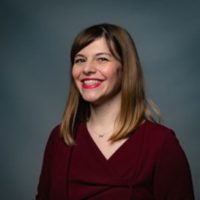Dr. Maria Kottari
Energy Transition, Climate & Sustainability Expert
School of Transnational Governance –European University Institute
The Energy Matrix
Introduction
Maria Kottari is a research associate at the School of Transnational Governance – European University Institute and founder of the policy consultancy The Energy Matrix. She is an expert of international politics and governance in the world of energy transition.
Maria leads multiple initiatives on and around just transition principles, gender mainstreaming and women empowerment
Independence and perseverance
Women might sometimes be afraid to go alone to be more independent.
This is something imposed from the society. Sometimes you find people around you discourage you from achieving your goals, just because you are a woman. Personally, I always loved to have the liberty to present myself in a setting that I design and continuously develop myself. I faced a lot of unfriendly reactions and it was not an easy road, but I have achieved everything I want now.
My position at the University and my Consultancy, “The Energy Matrix”, give me the opportunity to fully express my ideas. Every day brings a new challenge, but it is that struggle that defines you and gives you back more than just money. If I wanted to listen the norms of the society people around me, I would have not been here today.
Inclusion versus equality
Being a woman and not an engineer in this sector made it difficult for me.
I was often not heard and not taken seriously. In general, I was not following the norms of the society. Our society is not very welcoming to ambitious women. I am saying this with full respect to the male society, as they also have obligations and are following certain norms.
In fact, I prefer the term “inclusion” to “equality”. Equality implies that there is a battle and both sides should end up equal, but inclusiveness is about being open and respectful of each other. I believe, we as women in the energy sector, should not position ourselves as we are in an arena and should win a battle! In that case we are precisely reproducing male attitude. We should stand up and tell our view on the energy transition and propose the value that we can bring to the discussion.
Complex inclusion
We are people and we are complex ourselves!
Although gender equality and inclusion are included in the decision-making tables, the debate of inclusion is still open.
We are pushing for having more female professional in high positions. However, the mere fact of having a woman in the management board will not make the team equal. It is not only a matter of who is in charge, but it is about how different ideas are respected.
A safe community
The 75inQ community is a safe and enriching environment for networking. I like the fact that it is to the point and has a clear goal. Everyone in the network is concerned with energy transition. What I really like in a female network is that people do not try to patronize each other. They are willing to open and are honest in terms of their personal matters.
Inclusion at all levels
The complexities of the energy transition reflect the energy sector and the climate itself. We are not sustainable in consumption. We need to build a new paradigm for growth and living patterns. It is going to take us many years to do that, but inclusiveness already places us better. People are affected by the whole process of adaptation and therefore, should be heard in the policy making. Another pillar of inclusion can be inclusion of different country experiences and cultures. Some countries might be lagging their commitments because of, for example, their history in the fossil-fuel industry. They need help to take steps and adapt.
knowledge sharing
II want to put my energy to persuade different sectors that all voices need to be heard. It is not a power game anymore. Climate change is an issue threatening our existence and we need to unite to successfully tackle it it! I like to share my knowledge with other individuals, organizations, education institutes, companies, civil society etc.. I would like to transfer my knowledge to other countries and to help them revise and develop their adaptation agenda.


 Annoesjka Nienhuis
Annoesjka Nienhuis